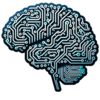
Back ديب مايند Arabic Google DeepMind Azerbaijani دیپمایند AZB Google DeepMind Catalan DeepMind German DeepMind DIQ DeepMind Greek Google DeepMind Spanish DeepMind Estonian DeepMind Basque
 | |
 Headquarters in Kings Cross, London | |
| Google DeepMind | |
| Company type | Subsidiary |
| Industry | Artificial intelligence |
| Founded | 23 September 2010[1] |
| Founders | |
| Headquarters | London, England[2] |
Key people | |
| Products | AlphaGo, AlphaStar, AlphaFold, AlphaZero |
Number of employees | c. 2,000 (2023)[3] |
| Parent | |
| Website | deepmind |
| Part of a series on |
| Artificial intelligence |
|---|
DeepMind Technologies Limited,[4] doing business as Google DeepMind, is a British-American artificial intelligence research laboratory which serves as a subsidiary of Google. Founded in the UK in 2010, it was acquired by Google in 2014.[5] The company is based in London, with research centres in Canada,[6] France,[7] Germany, and the United States.
Google DeepMind has created neural network models that learn how to play video games in a fashion similar to that of humans,[8] as well as Neural Turing machines (neural networks that can access external memory like a conventional Turing machine),[9] resulting in a computer that loosely resembles short-term memory in the human brain.[10][11]
DeepMind made headlines in 2016 after its AlphaGo program beat a human professional Go player Lee Sedol, a world champion, in a five-game match, which was the subject of a documentary film.[12] A more general program, AlphaZero, beat the most powerful programs playing go, chess and shogi (Japanese chess) after a few days of play against itself using reinforcement learning.[13]
In 2020, DeepMind made significant advances in the problem of protein folding with AlphaFold.[14] In July 2022, it was announced that over 200 million predicted protein structures, representing virtually all known proteins, would be released on the AlphaFold database.[15][16]
DeepMind posted a blog post on 28 April 2022 on a single visual language model (VLM) named Flamingo that can accurately describe a picture of something with just a few training images.[17][18] In July 2022, DeepMind announced the development of DeepNash, a model-free multi-agent reinforcement learning system capable of playing the board game Stratego at the level of a human expert.[19] The company merged with Google AI's Google Brain division to become Google DeepMind in April 2023.
In November 2023, Google DeepMind announced an Open Source Graph Network for Materials Exploration (GNoME). The tool proposes millions of materials previously unknown to chemistry, including several hundred thousand stable crystalline structures, of which 736 had been experimentally produced by the Massachusetts Institute of Technology, at the time of the release.[20][21]
- ^ "DeepMind Technologies Limited – Overview (free company information from Companies House)". Companies House. Retrieved 13 March 2016.
- ^ "King's Cross - S2 Building - SES Engineering Services". www.ses-ltd.co.uk. Retrieved 14 July 2022.
- ^ Efrati, Amir (11 October 2023). "DeepMind Cut 20% of Its Expenses Before Merging with Google". The Information. Archived from the original on 12 October 2023.
- ^ "DEEPMIND TECHNOLOGIES LIMITED overview - Find and update company information - GOV.UK". Companies House. Retrieved 22 July 2023.
- ^ Bray, Chad (27 January 2014). "Google Acquires British Artificial Intelligence Developer". DealBook. Retrieved 4 November 2019.
- ^ "About Us". DeepMind.
- ^ "A return to Paris". DeepMind.
- ^ "The Last AI Breakthrough DeepMind Made Before Google Bought It". The Physics arXiv Blog. 29 January 2014. Retrieved 12 October 2014.
- ^ Graves, Alex; Wayne, Greg; Danihelka, Ivo (2014). "Neural Turing Machines". arXiv:1410.5401 [cs.NE].
- ^ Best of 2014: Google's Secretive DeepMind Startup Unveils a "Neural Turing Machine" Archived 4 December 2015 at the Wayback Machine, MIT Technology Review
- ^ Graves, Alex; Wayne, Greg; Reynolds, Malcolm; Harley, Tim; Danihelka, Ivo; Grabska-Barwińska, Agnieszka; Colmenarejo, Sergio Gómez; Grefenstette, Edward; Ramalho, Tiago (12 October 2016). "Hybrid computing using a neural network with dynamic external memory". Nature. 538 (7626): 471–476. Bibcode:2016Natur.538..471G. doi:10.1038/nature20101. ISSN 1476-4687. PMID 27732574. S2CID 205251479.
- ^ Kohs, Greg (29 September 2017), AlphaGo, Ioannis Antonoglou, Lucas Baker, Nick Bostrom, retrieved 9 January 2018
- ^ Silver, David; Hubert, Thomas; Schrittwieser, Julian; Antonoglou, Ioannis; Lai, Matthew; Guez, Arthur; Lanctot, Marc; Sifre, Laurent; Kumaran, Dharshan; Graepel, Thore; Lillicrap, Timothy; Simonyan, Karen; Hassabis, Demis (5 December 2017). "Mastering Chess and Shogi by Self-Play with a General Reinforcement Learning Algorithm". arXiv:1712.01815 [cs.AI].
- ^ Callaway, Ewen (30 November 2020). "'It will change everything': DeepMind's AI makes gigantic leap in solving protein structures". Nature. Retrieved 31 August 2021.
- ^ Geddes, Linda (28 July 2022). "DeepMind uncovers structure of 200m proteins in scientific leap forward". The Guardian.
- ^ "AlphaFold reveals the structure of the protein universe". DeepMind. 28 July 2022.
- ^ "Tackling multiple tasks with a single visual language model". www.deepmind.com. Retrieved 29 April 2022.
- ^ Alayrac, Jean-Baptiste (2022). "Flamingo: a Visual Language Model for Few-Shot Learning" (PDF). arXiv:2204.14198.
- ^ "Deepmind AI Researchers Introduce 'DeepNash', An Autonomous Agent Trained With Model-Free Multiagent Reinforcement Learning That Learns To Play The Game Of Stratego At Expert Level". MarkTechPost. 9 July 2022.
- ^ Merchant, Amil; Batzner, Simon; Schoenholz, Samuel S.; Aykol, Muratahan; Cheon, Gowoon; Cubuk, Ekin Dogus (December 2023). "Scaling deep learning for materials discovery". Nature. 624 (7990): 80–85. doi:10.1038/s41586-023-06735-9. ISSN 1476-4687. PMC 10700131.
- ^ "Google DeepMind's new AI tool helped create more than 700 new materials". MIT Technology Review. Retrieved 2 January 2024.
© MMXXIII Rich X Search. We shall prevail. All rights reserved. Rich X Search
